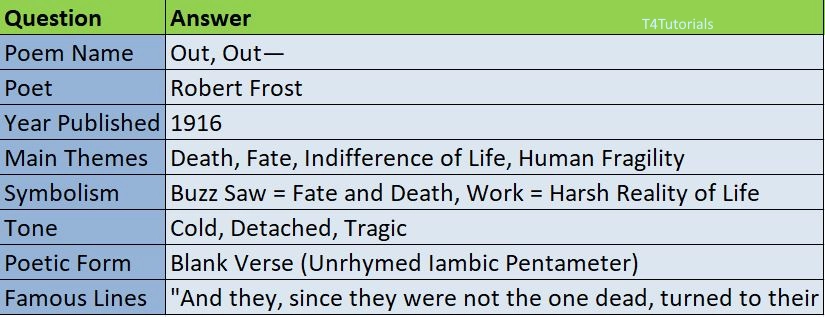Summary:
“Out, Out—” is a narrative poem by Robert Frost, first published in 1916. The poem is based on a tragic accident where a young boy, while cutting wood with a buzz saw, loses his hand and dies due to excessive bleeding.
The poem takes its title from Shakespeare’s Macbeth, where Macbeth laments the fragility of life:
“Out, out, brief candle!”
The buzz saw is personified, as it seems to “leap” and claim the boy’s hand. Despite the severity of the accident, the boy’s death is met with indifference by the people around him, as they return to their daily lives. The poem highlights the harsh realities of life, death, and the fleeting nature of existence.
Frost’s use of blank verse (unrhymed iambic pentameter) gives the poem a natural, storytelling rhythm while maintaining a cold, detached tone to emphasize the cruelty of fate.
MCQs:
- Who wrote the poem Out, Out—?
A) Walt Whitman
B) Robert Frost
C) Emily Dickinson
D) William Wordsworth
Answer: B) Robert Frost - In which year was Out, Out— published?
A) 1912
B) 1916
C) 1923
D) 1930
Answer: B) 1916 - What is the central theme of the poem?
A) The beauty of nature
B) The harshness of life and death
C) The power of love
D) The joy of childhood
Answer: B) The harshness of life and death - What accident occurs in the poem?
A) The boy falls from a tree
B) The boy cuts his hand with a buzz saw
C) The boy drowns in a river
D) The boy is attacked by an animal
Answer: B) The boy cuts his hand with a buzz saw - What literary device is used to describe the buzz saw?
A) Simile
B) Personification
C) Hyperbole
D) Irony
Answer: B) Personification - What does the title Out, Out— reference?
A) A speech from Shakespeare’s Macbeth
B) A phrase from the Bible
C) A Greek myth
D) A famous battle
Answer: A) A speech from Shakespeare’s Macbeth - What happens after the boy’s death?
A) His family mourns for days
B) His family moves away
C) The people around him return to their daily lives
D) The saw is destroyed
Answer: C) The people around him return to their daily lives - What poetic form does Frost use in Out, Out—?
A) Sonnet
B) Free verse
C) Blank verse
D) Rhymed couplets
Answer: C) Blank verse - What is the boy’s reaction after the accident?
A) He cries for help
B) He laughs it off
C) He tries to hold his hand together
D) He runs away
Answer: C) He tries to hold his hand together - What is the tone of the poem?
A) Joyful and uplifting
B) Cold and indifferent
C) Romantic and passionate
D) Angry and vengeful
Answer: B) Cold and indifferent
| Question | Answer |
| Poem Name | Out, Out— |
| Poet | Robert Frost |
| Year Published | 1916 |
| Main Themes | Death, Fate, Indifference of Life, Human Fragility |
| Symbolism | Buzz Saw = Fate and Death, Work = Harsh Reality of Life |
| Tone | Cold, Detached, Tragic |
| Poetic Form | Blank Verse (Unrhymed Iambic Pentameter) |
| Famous Lines | “And they, since they were not the one dead, turned to their affairs.” |
